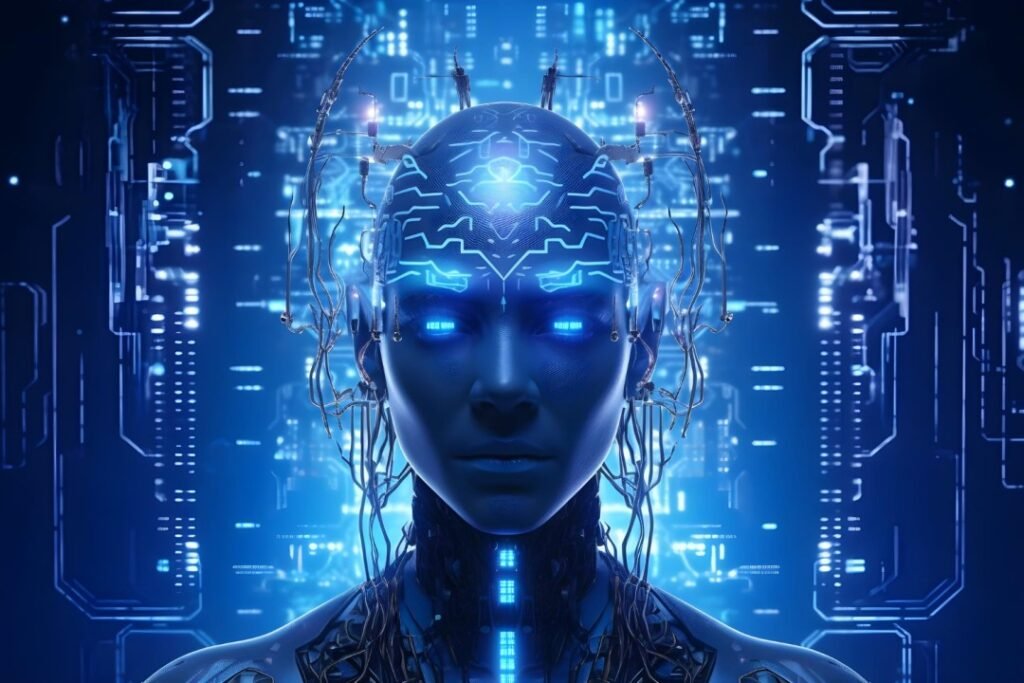Artificial Intelligence (AI) is rapidly changing the world, bringing new opportunities and challenges. The top trends in artificial intelligence are transforming various industries, from healthcare to finance and beyond. These advancements are not only making processes more efficient but also creating new ways for businesses to operate. In this article, we will explore some of the most significant trends in AI and how they are revolutionizing different fields.

Top Trends in Artificial Intelligence: Machine Learning and Automation
Machine learning and automation are two of the most impactful trends in artificial intelligence today. These technologies help machines learn from data, improving their performance over time without human intervention.
1. Machine Learning: Teaching Machines to Learn
Machine learning (ML) is one of the top trends in artificial intelligence. It involves teaching computers to learn from data and make decisions based on patterns. Instead of being programmed with specific instructions, machines can analyze large sets of data, recognize patterns, and improve over time.
How Machine Learning Is Revolutionizing Industries
Machine learning is being used in many fields, including healthcare, finance, and retail. For instance, in healthcare, ML helps doctors predict diseases by analyzing patient data. In finance, it’s used to detect fraud by recognizing unusual patterns in transactions. This makes processes faster, more accurate, and cost-effective.
2. Automation: Making Work More Efficient
Automation is another significant trend in AI that is improving efficiency. With automation, machines perform tasks without human involvement. This is particularly useful in industries like manufacturing and logistics, where repetitive tasks can be automated, saving time and reducing errors.
Why Automation Is a Game-Changer
Automation not only speeds up processes but also frees up human workers to focus on more complex tasks. In manufacturing, robots are used to assemble products more quickly and precisely. In offices, AI-driven software handles administrative tasks like scheduling meetings, making work more productive.
Top Trends in Artificial Intelligence: Natural Language Processing and AI Ethics
In addition to machine learning and automation, other important trends in artificial intelligence are shaping its development. Natural language processing (NLP) and AI ethics are becoming more critical as AI continues to advance.
1. Natural Language Processing: Teaching Machines to Understand Humans
Natural language processing (NLP) is a subfield of AI that focuses on enabling machines to understand and process human language. This technology allows AI systems to read, understand, and even respond to text or speech in a way that feels natural.
How NLP Is Changing Communication
NLP is behind many of the AI-powered chatbots and virtual assistants, like Siri and Alexa. These tools can understand questions and provide relevant answers, making it easier for people to interact with technology. NLP is also used to analyze customer reviews, improve language translation, and assist in writing content. As NLP improves, the ability for machines to interact with humans will continue to become more seamless.
2. AI Ethics: Ensuring Fair and Responsible Use
As AI becomes more powerful, there is growing concern about its ethical implications. AI ethics focuses on making sure that AI is used fairly and responsibly. This includes preventing bias in AI models, ensuring transparency in decision-making, and protecting privacy.
Why AI Ethics Is Crucial
As AI makes more decisions, it’s important that these decisions are unbiased and fair. For example, AI systems used in hiring should not favor one group over another. Addressing AI ethics is essential to ensure that AI technology benefits everyone and doesn’t cause harm. Many companies and governments are now focusing on creating guidelines and regulations to make AI more ethical.
Top Trends in Artificial Intelligence: Advancements in AI Hardware
Hardware advancements are another trend in AI that cannot be ignored. As AI models become more complex, they require more processing power, which leads to new developments in AI hardware.
1. AI Chips: Boosting Performance
AI chips are specialized processors designed to handle the unique demands of artificial intelligence. These chips are optimized for tasks like machine learning and data processing, making AI applications faster and more efficient.
How AI Chips Improve Performance
AI chips, such as those made by companies like NVIDIA, are key to enhancing AI capabilities. They allow machines to process large amounts of data at higher speeds. As more industries adopt AI, these chips will become even more important for running AI systems effectively.
2. Quantum Computing: The Next Step in AI
Quantum computing is still in its early stages, but it holds the potential to revolutionize AI. Unlike traditional computers, quantum computers use quantum bits (qubits), which can process much more information simultaneously. This could significantly improve the power and speed of AI systems.
Why Quantum Computing Is a Future Game-Changer
Quantum computing could solve complex problems that current computers struggle with. For example, it could improve machine learning algorithms by processing data faster and more accurately. Although quantum computing is still developing, it shows promise for making AI even more powerful in the future.
Conclusion: Embracing the Top Trends in Artificial Intelligence
In conclusion, the top trends in artificial intelligence are driving significant changes across industries. Machine learning and automation are making tasks more efficient, while natural language processing is improving communication between humans and machines. AI ethics is ensuring that these technologies are used fairly, and advancements in AI hardware are boosting performance. As AI continues to grow, it will open up even more opportunities for innovation and improvement. By embracing these trends, we can expect an even brighter future where AI works alongside humans to solve complex problems and create new possibilities.











